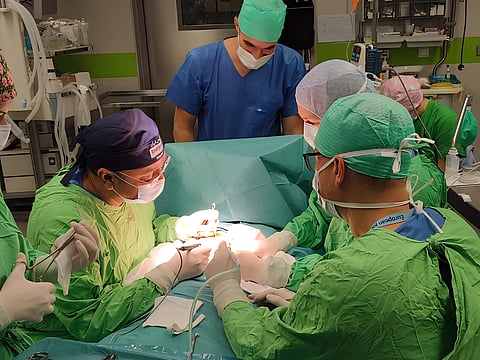Born with organs outside his body: UAE doctor saves boy from rare 1-in-5,000 birth defect
From Abu Dhabi to Hungary, a medical mission gives Benett a second chance at life

Abu Dhabi: In a remarkable case of cross-border medical collaboration, an Abu Dhabi-based doctor has successfully led a series of complex surgeries to save and transform the life of a Hungarian boy born with his abdominal organs outside his body – a rare and potentially fatal condition.
Prof Dr Amulya Saxena, Consultant Paediatric Surgeon at Burjeel Hospital, Abu Dhabi, was specially invited by the University of Szeged in Hungary to treat Benett, who was born in August 2020 with a severe congenital condition known as a giant omphalocele. This rare condition, affecting just 1 in 5,000 births, occurs when the abdominal wall does not close properly during foetal development, leaving vital organs such as the liver and spleen outside the body.
Early struggles
Diagnosed prenatally, Benett underwent several surgeries shortly after birth, including a ‘silo’ treatment to protect the exposed organs. Two additional procedures were carried out in an effort to manage the defect. However, a complete reconstruction of the abdominal wall could not be achieved. He was discharged after about 80 days, still living with a large abdominal hernia and underdeveloped abdominal muscles.
As Benett grew, the scarred skin stretched, but the abdominal muscles remained widely separated, continuing to expose the internal organs. By the time he began walking, the need for further surgical reconstruction had become urgent.
5,000km to Hungary
Recognising the complexities of the case, doctors in Hungary turned to Prof Dr Saxena, an internationally renowned expert in chest wall deformities such as pigeon chest and funnel chest, as well as complex paediatric and neonatal surgeries. A former President of the European Paediatric Surgeons’ Association and Editor-in-Chief of the Journal of Paediatric Endoscopic Surgery, Prof Dr Saxena has performed advanced procedures in more than 20 countries, specialising in rare congenital anomalies such as giant omphaloceles.
“Giant omphaloceles are particularly challenging due to the complexity of reconstructive procedures and the risk of complications,” Prof Dr Saxena told Gulf News. “Our goal with Benett was not only to address the immediate surgical requirements but also to ensure long-term functionality and a better quality of life.”
Reconstructive surgery
Prof Dr Saxena began treating Benett in 2022 and performed his fifth surgery in December last year. The procedure involved placing another biological graft made of absorbable biomaterial to reinforce the abdominal wall, while gradually mobilising the abdominal muscles to close the defect.
“Each surgery represented a step towards enabling Benett to lead a normal life. With this latest procedure, we are optimistic that his abdominal wall will be reconstructed, minimising the need for further interventions,” Prof Dr Saxena said.
Second chance at life
The surgeries have proved transformative for Benett. Once severely limited by his condition, he is now an active and playful four-year-old with significantly improved mobility. His parents, who initially struggled to comprehend the seriousness of his condition, expressed profound gratitude for the care he received.
“Seeing Benett smile and play like other children brings us immense joy and relief. We are deeply grateful to Prof Dr Saxena and the entire medical team for their unwavering support and exceptional care. Their expertise has truly given our son a second chance at a happy and healthy life,” said his parents.
International collaboration
Benett’s case stands as a testament to the power of international cooperation in healthcare.
“Benett’s case demonstrates how international collaboration can lead to exceptional outcomes for patients with rare conditions. It shows what we can achieve when we unite for a common purpose,” said a representative of the paediatric surgical team at the University of Szeged.
Sign up for the Daily Briefing
Get the latest news and updates straight to your inbox


